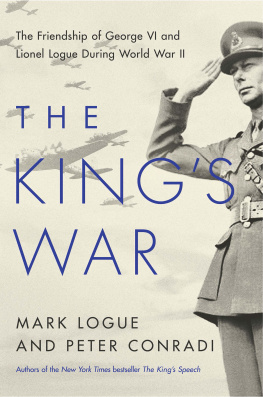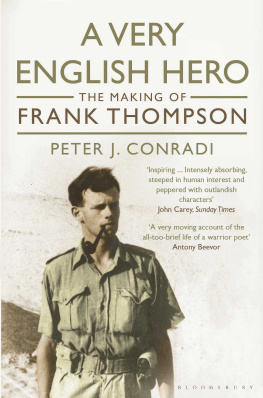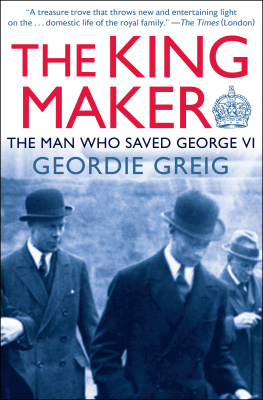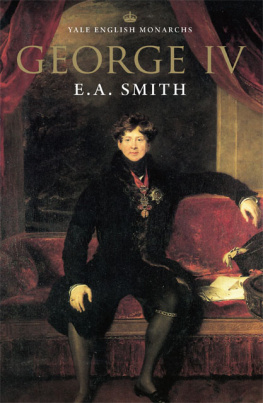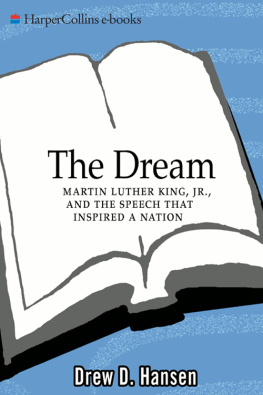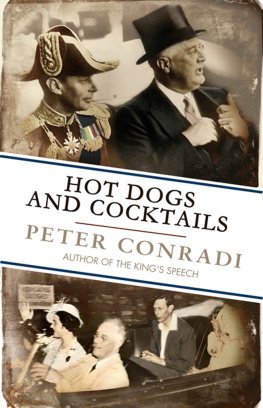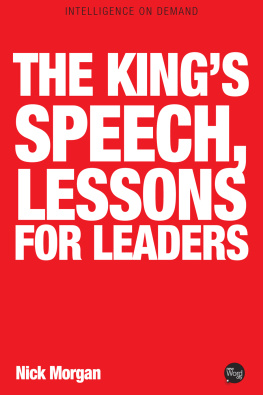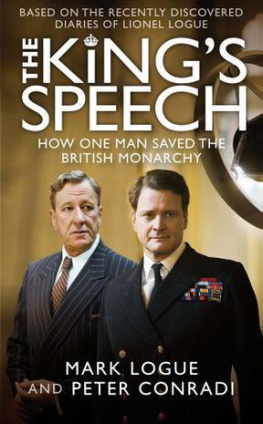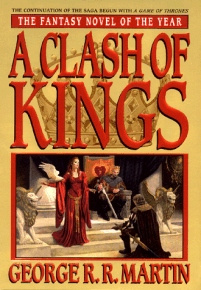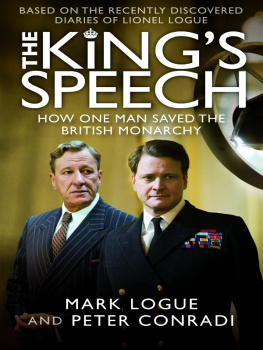Contents

THE KINGS WAR
The Friendship of George VI and Lionel Logue
During World War II
MARK LOGUE
AND PETER CONRADI

PEGASUS BOOKS
NEW YORK LONDON
T HE K INGS W AR
Pegasus Books, Ltd.
148 West 37th Street, 13th Floor
New York, NY 10018
Copyright 2019 by Mark Logue and Peter Conradi
First Pegasus Books hardcover edition September 2019
All rights reserved. No part of this book may be reproduced in whole
or in part without written permission from the publisher, except by reviewers
who may quote brief excerpts in connection with a review in a newspaper, magazine,
or electronic publication; nor may any part of this book be reproduced, stored in a
retrieval system, or transmitted in any form or by any means electronic, mechanical,
photocopying, recording, or other, without written permission from the publisher.
ISBN:978-1-64313-192-4
ISBN: 978-1-64313-269-3 (ebook)
To my wife Ruth, who contributed substantially to this book.
To my children Amy, Hannah and Laurie,
even though they still havent read The Kings Speech.
To my mother-in-law Beryl, for her support
(especially over the past year).
To all my close friends for their kindness and love.
Contents
The Kings Speech was a huge critical and commercial success when it was released at the end of 2010, picking up seven BAFTAs and four Oscars, including Best Picture and Best Director for Tom Hooper, Best Actor for Colin Firth for his memorable portrayal of George VI, and Best Screenplay for David Seidler. It must have been watched by at least forty million people at the cinema alone. In the years since, millions more have viewed it on DVD, Netflix, Amazon and on television.
It is not difficult to understand the films appeal: the story of the future Kings battle with his life-long stammer and the help he received from Lionel Logue, his irreverent Australian speech therapist, clearly struck a chord with audiences. Cinema-goers revelled in its Englishness, were touched by Firths performance as the gentle, vulnerable monarch and applauded Geoffrey Rushs portrayal of Logue with his determination to cut through protocol to help his royal patient. It helped that the story was true: George VI did have a stammer and, yes, he was helped by an Australian commoner who used highly unconventional methods.
For me the film meant something much more: Lionel Logue was my grandfather, but he died in 1953, twelve years before I was born, so he was always something of a mystery. His story was told to me when I was a child, but I never paid too much attention to what seemed like ancient history even though, growing up, I became fascinated by the medals, signed royal photographs and mementoes scattered around the house.
In fact, it wasnt until my own father, Antony the third of Lionels three sons died in 2001 that I began to appreciate the role that my grandfather had played in the history of the royal family. It fell to me to organize his personal papers, which had passed first to his eldest son, Valentine, an eminent brain surgeon, and then, on Valentines death in 2000, to my father, who had locked them away in a tall grey filing cabinet in his study.
Coming face to face with my grandfather for the first time, on 31 August 2010, at a private screening of the film at the Odeon in Panton Street, London, was an extraordinary experience. It was a year earlier, when Seidlers script was already written and the shooting of The Kings Speech was about to begin at Elstree Studios and on location around London, that the film-makers got in touch with me. Although I, too, live in London, the connection came via an academic website published by Caroline Bowen, a Sydney-based speech and language pathologist, which at the time was the only online source of information on Lionel Logue. The producers were excited to learn I had my grandfathers papers, most of which had never been seen before. As the papers were transcribed, Hooper and Seidler rewrote the script to incorporate the gems of information that I found.
None of this, though, could fully prepare me for seeing Rush as my grandfather, alongside Firth, Helena Bonham Carter as the Queen and Jennifer Ehle as my grandmother Myrtle. It was surreal to see my father depicted as a ten-year-old boy. I still remember the day when I was invited on the set and met Ben Wimsett, who played him. A scene they were filming particularly resonated with me: Rushs character hovered over my father and Valentine while they recited Shakespeare. It reminded me of a scene from my own childhood when I struggled to do the same, while my father, who had a prodigious memory, repeated verbatim the lengthy passages he had learnt as a boy.
The success of the film provided me with a series of even more surreal experiences: during the first few weeks following its release, I made countless newspaper and television appearances in both Britain and America, during which I was asked to talk about the real Lionel Logue. Then came the Oscars themselves, when I was invited to a party at the Chateau Marmont in Los Angeles. As the ceremony ended in triumph for The Kings Speech, the room filled with every Hollywood star you could mention. The celebrations went on until dawn.
I went to another party later that day hosted by the films producers, Simon Egan and Gareth Unwin, at a luxury villa in the Hollywood Hills. Glimpsing Simons fifteen-month-old daughter, I thought she would look cute photographed with the Oscar, so I handed her the statuette and stepped back to take the picture. She lost her grip just as I was clicking the shutter, and the Oscar fell to the ground with a loud bang, bouncing down the stone steps. Everyone at the party fell silent. The horror was evident on everyones face not least mine, where it was mixed with embarrassment and shame.
The statuette suffered several dents: it had a bashed head, damaged shoulder and a dented stand, and gold plating had flaked off the chest. The Academy of Motion Picture Arts and Sciences was contacted immediately, and, to my relief, it turned out they have an Oscar Hospital to cope with the all-too-common injuries sustained by the statuettes during victory celebrations. When Simon went to have it repaired, he was half expecting to see a queue of sheepish Oscar winners in there with their own damaged statuettes nursing hangovers.
There is only so much you can show in 118 minutes, however brilliant the director and Hooper, for whom this was only his second feature, was certainly that. That was why, after having become involved in the making of the film, I also set out to tell the real-life story behind the events it depicted, working with Peter Conradi, a journalist with the Sunday Times. We entitled our book The Kings Speech: How One Man Saved the British Monarchy. Published to coincide with the film, it was a bestseller in both Britain and America and translated into more than twenty languages.
During the more than a quarter of a century they worked together, my grandfather remained loyal to the King, respecting his privacy and the confidential nature of the treatment he gave him. He chose to remain behind the scenes, largely silent, rarely giving interviews, never publishing his work or having his methods scrutinized by peers or teaching them to students. He also always worked alone. Perhaps this was because he felt like an imposter, never having received any formal training or qualifications, and was forced to battle the prejudices of established medical institutions, as well as a degree of anti-Australian sentiment.

